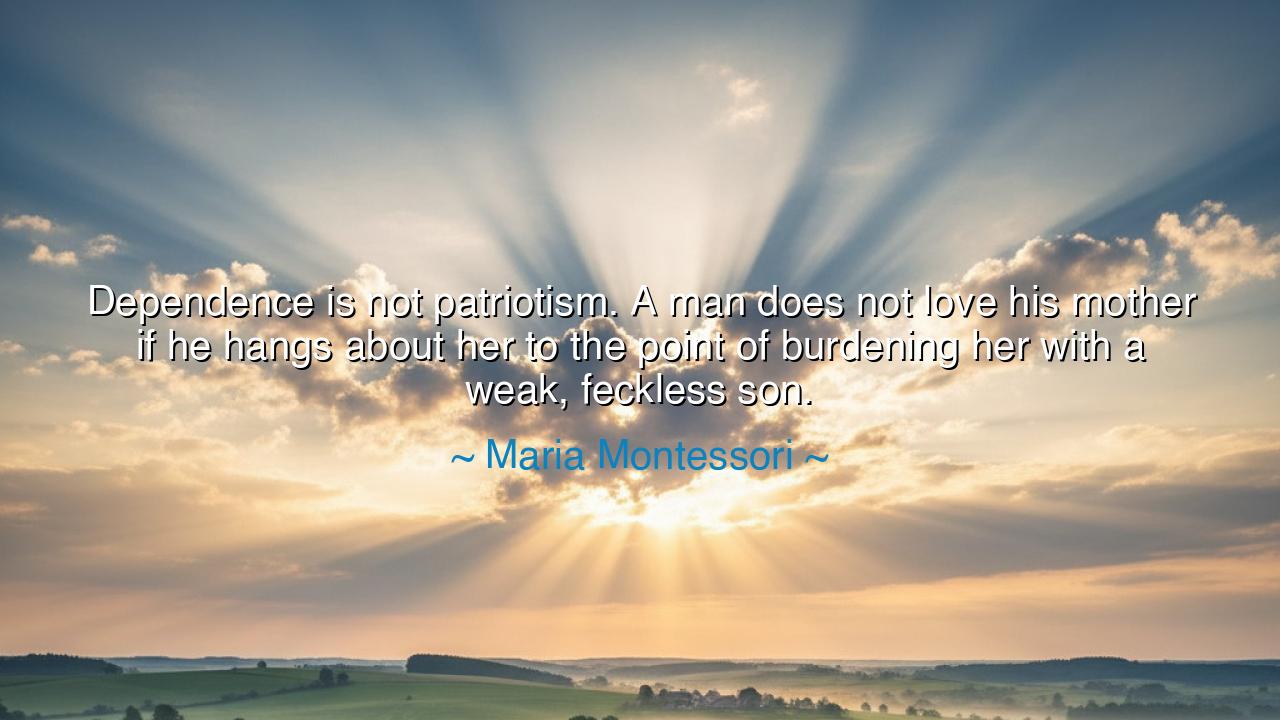
Dependence is not patriotism. A man does not love his mother if
Dependence is not patriotism. A man does not love his mother if he hangs about her to the point of burdening her with a weak, feckless son.






Maria Montessori, the great teacher of children and nations, once said with piercing wisdom: “Dependence is not patriotism. A man does not love his mother if he hangs about her to the point of burdening her with a weak, feckless son.” These words cut through the illusions of false devotion. For just as a mother does not desire to raise a son who clings to her helplessly, so too a nation is not honored by citizens who lean upon her endlessly without strength of their own. True patriotism is not dependence, but responsibility; not endless asking, but courageous giving.
The origin of this thought lies in Montessori’s philosophy of independence and self-mastery. Known for her educational method that emphasized freedom, responsibility, and growth, she understood that to love is not to smother, but to empower. In comparing mother and son to nation and citizen, she revealed that a country, like a parent, is honored when its children stand tall, live strongly, and contribute rather than drain. Just as a weak and dependent son burdens his mother’s heart, so a citizen who refuses responsibility weakens the very fabric of the homeland he claims to love.
History provides us with many illustrations of this truth. Consider the fate of the Roman Empire. As long as its citizens were strong, disciplined, and willing to sacrifice, Rome thrived. But when later generations grew dependent upon the state for bread and entertainment, their so-called patriotism was hollow. They loved the idea of Rome but not enough to serve her. Their dependence became a burden too heavy for the empire to carry, and in time, Rome crumbled under its own weight. Thus Montessori’s warning is ancient: a nation cannot endure if its children mistake dependence for devotion.
In contrast, look at the struggles of the American Revolution. The colonists could have remained dependent upon Britain, claiming loyalty while clinging to the security of empire. But true patriotism demanded independence—self-reliance, risk, and sacrifice. They proved their love for their “mother country” not by burdening her with endless dependence, but by standing on their own feet, building a new nation from their courage. Their devotion to liberty showed that strength, not weakness, is the highest form of loyalty.
The deeper meaning of Montessori’s words is that love matures into responsibility. Just as a grown son proves his love for his mother by caring for her in her old age, not by clinging helplessly to her, so the mature citizen proves his patriotism by serving his country, protecting her, and ensuring her flourishing. Dependence is not love; it is immaturity. True devotion requires the courage to act, to give, and to carry burdens, not to create them.
The lesson for us is clear: if you would love your country, do not merely consume what she provides—schools, roads, safety, culture—while offering nothing in return. Rise up and serve. Contribute your labor, your integrity, your ideas, and, if need be, your sacrifice. Do not mistake shallow slogans or passive loyalty for true patriotism. To love your nation is to strengthen her, not weaken her with idleness or self-indulgence.
Practically, this means living with self-reliance and service. Build your own strength—physically, morally, intellectually—so that you may stand as a pillar, not a burden. Seek ways to give back: through community, through honest work, through justice, through care for the land. Teach the next generation not to cling weakly to what is provided, but to grow into men and women who can provide for others. In this way, both the “mother” and the nation are honored.
So remember, children of tomorrow: dependence is not patriotism. To love your country is not to cling helplessly to her gifts, but to rise in strength, to give, to protect, and to serve. Just as a mother is proud of a strong, responsible son, so too a nation rejoices in citizens who carry her legacy with honor. Stand tall, then, and show your love not in dependence, but in deeds of courage and strength.






AAdministratorAdministrator
Welcome, honored guests. Please leave a comment, we will respond soon